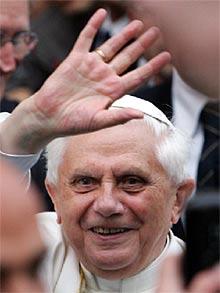[For the audio version of this homily, click here: Trinity Sunday 2005]
A couple from
However, because of their busy schedules and previous commitments, they were forced to fly down on separate days. The husband booked his flight for Thursday, and his wife was scheduled to join him on Friday.
When he arrived in
Unfortunately, however, he accidentally left out one letter in her e-mail address.
Meanwhile, somewhere in
The widow decided to check her e-mail, expecting to find some letters of condolence from concerned relatives and friends.
She read the first message in her mailbox, screamed, and fainted.
Her son rushed into the room, found his mom on the floor, and then looked at the computer screen.
There he found these words:
To: My loving wife.
Subject: I’ve arrived.
Date: January 15.
I know you’re surprised to hear from me. They have computers here now and you’re allowed to send e-mails to your loved ones.
I’ve just arrived and have checked in. I see that everything has been prepared for your arrival tomorrow. Looking forward to seeing you! Hope your journey is as uneventful as mine was.
P.S. It sure is hot down here!
There are two morals to that little story. Number one, make sure you don’t leave out any letters in e-mail addresses; and number two, never forget that there is something at stake in this life!
When that poor woman in
In today’s Gospel text from John 3, Jesus makes it clear that hell is also a possibility for each and every one of us and for every human person. Furthermore, he indicates that this is not something that happens by accident. It happens by choice: by choosing those attitudes and behaviors that put us on what Jesus later called the “wide road that leads to destruction.”
But before he gets into that dimension of things, Jesus clearly states that God wants something better for us—namely, heaven—and that God has done everything necessary to make it possible for us to get there. He says, “God so loved the world that he gave his only Son, so that everyone who believes in him might not perish but might have eternal life. For God did not send his Son into the world to condemn the world, but that the world might be saved through him.”
In Trinitarian terms (this, remember, is Trinity Sunday), that text says, “The infinite and perfectly happy Triune God loved us so much, that the Second Person of that Trinity took on mortal flesh and came into this world of suffering and pain, in order to rescue us from the eternal consequences of the sin we have freely chosen. Later, after he had risen from the dead and ascended into heaven, the Son (and the Father) sent us the Holy Spirit—the Third Person of the Blessed Trinity—to give us grace through Baptism and the sacraments—the grace we must have in our souls to enter into his eternal kingdom. God did all this so that the world might be saved through Jesus.”
Only after he expresses this positive truth does our Lord mention the possibility of going to hell. In that regard, he says, “Whoever believes in him [Jesus there is referring to himself] will not be condemned, but whoever does not believe has already been condemned, because he has not believed in the name of the only Son of God.”
Which leads to the obvious question: What does it mean to ‘believe’? Does it simply involve saying Amen to a set of intellectual propositions, such as we have in the Nicene Creed?
The answer is No! Belief is more than that! Belief, according to Jesus, is not simply a “head trip.”
When our Lord tells us we must “believe,” he means two things: yes, we must assent with our minds to the Creed and the Catechism; but secondly—and just as importantly—we must obey with our lives!
Belief, for Jesus, always implies obedience. This is crystal clear, incidentally, from a very interesting line that we read later on in John 3. In verse 36 of that chapter it says, “Whoever believes in the Son has eternal life, but whoever disobeys the Son will not see life, but the wrath of God remains upon him.” Notice that instead of saying, “whoever disbelieves in the Son,” the text says, “whoever disobeys the Son.” Disobedience, not disbelief, is presented as the opposite of belief.
Obviously for Jesus—and for John, the author of the 4th Gospel—belief and obedience were pretty much synonymous.
And that’s the way they should be for us—and for everyone who claims to be a believer in Jesus Christ.
The philosopher Descartes once said, “I think, therefore I am.”
In a similar fashion, every Catholic and every Christian should say, “I believe, therefore I obey.”
May that be our common philosophy of life, as disciples of the Lord. If it is, then even if they do allow e-mails out of hell someday in the far distant future, we can be confident that our relatives and friends won’t be receiving any of those e-mails from us.







